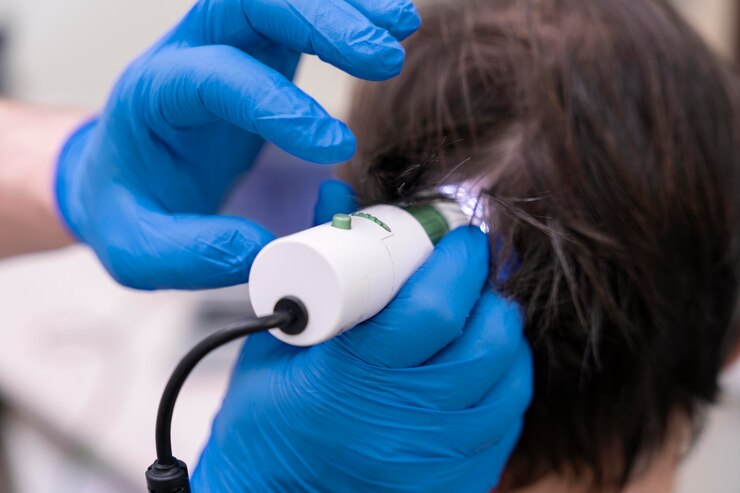Scalp Analysis

Scalp analysis is the process of evaluating the health and condition of the scalp in order to determine the underlying causes of scalp issues such as dandruff, hair thinning, excessive oiliness, dryness, or irritation. A thorough scalp analysis can help identify conditions that may be affecting hair growth or overall scalp health.
Types of Scalp Analysis
Visual Inspection
- A visual inspection is the first step in scalp analysis. This involves looking at the scalp for signs of inflammation, redness, flakiness, excess oil, or dryness. The hair density and scalp condition are also assessed for any abnormalities like hair thinning or patches of hair loss.
Scalp Microscopy
- Some professionals use a microscope or digital dermatoscope to examine the scalp more closely. This technology allows them to magnify the scalp to look for issues like scalp buildup, follicle health, dandruff, or scalp infections.
- This is especially useful for diagnosing conditions like seborrheic dermatitis, psoriasis, or fungal infections.
Scalp Hydration and Oil Levels
- A scalp hydration test measures the moisture levels of the scalp to determine if it is overly dry or oily.
- Oiliness or dryness may be indicators of underlying issues, such as overproduction of sebum or a lack of essential moisture in the scalp.
Hair Follicle Assessment
- The health of individual hair follicles can be evaluated through close inspection. This helps determine if there are any signs of follicle damage or inflammation that could hinder hair growth.
- This analysis is particularly useful for assessing hair loss or hair thinning caused by factors like androgenic alopecia (pattern baldness), telogen effluvium, or scalp infections.
Scalp pH Level Test
- The pH level of the scalp is important for maintaining a healthy balance. The scalp is naturally acidic (around a pH of 4.5–5.5), and an imbalance can lead to scalp conditions.
- If the pH is too high or low, it could indicate scalp issues that could be causing dandruff, irritation, or excessive oil production.
Common Scalp Conditions Identified During Analysis
Dandruff
- Dandruff is often caused by a yeast-like fungus (Malassezia) on the scalp. It leads to flaking, itching, and irritation. A scalp analysis can help identify whether it’s simply dry flakes or signs of fungal growth that require specific treatments.
Seborrheic Dermatitis
- This is a more severe form of dandruff caused by overactive sebaceous glands. It results in greasy, yellowish flakes and inflamed, red patches. Scalp analysis can help differentiate between regular dandruff and seborrheic dermatitis.
Psoriasis
- Psoriasis on the scalp presents as scaly, silvery patches that can be thick and inflamed. A scalp analysis helps diagnose psoriasis, which often requires medical treatments to control flare-ups.
Fungal Infections
- Ringworm (Tinea capitis) is a common fungal infection that leads to hair loss, circular patches of hair thinning, and itching. A professional scalp analysis can detect the presence of a fungal infection and recommend antifungal treatments.
Alopecia
- Alopecia areata is an autoimmune disorder that causes round patches of hair loss. A scalp analysis can help spot these patches early. Other forms of hair loss, such as telogen effluvium (temporary hair shedding due to stress or illness), can also be assessed.
Oily or Dry Scalp
- An overly oily scalp can lead to clogged hair follicles, dandruff, and acne on the scalp, while a dry scalp can cause irritation and itching. Scalp analysis will help determine whether you need to focus on balancing oil production or boosting moisture.
Hair Follicle Health
- Healthy hair follicles are essential for hair growth. A scalp analysis can detect whether follicles are clogged, inflamed, or damaged. Conditions like androgenic alopecia (male or female pattern baldness) can be identified by analyzing the condition of the follicles.
Hair Density and Thinning
- Scalp analysis helps assess whether hair density is thinning in certain areas, and whether the thinning is related to follicle issues, hormonal changes, or scalp conditions.
How Scalp Analysis Is Performed
Scalp analysis is typically done by a dermatologist, trichologist (hair and scalp specialist), or a trained professional at a hair salon. Here’s how the process typically works:
- Initial Consultation: A professional will ask about your hair care routine, lifestyle, medical history, and any scalp symptoms you’re experiencing (such as itching, flaking, hair loss, or redness).
- Visual and Microscopic Examination: They will perform a visual inspection of the scalp, checking for signs of common scalp conditions. If necessary, they may use a microscope or camera to analyze the scalp more deeply.
- Scalp Health Test: The professional may check the moisture level, oiliness, and pH of your scalp to help identify any imbalances.
- Analysis of Hair Follicles: Follicles may be examined under magnification to detect any signs of inflammation, scarring, or damage.
- Customized Recommendations: Based on the findings, you will be provided with a tailored treatment plan. This could include changes to your hair care routine, specialized products, or medical treatments depending on the condition identified.
Benefits of Scalp Analysis
- Accurate Diagnosis: Helps pinpoint the exact cause of scalp or hair problems.
- Personalized Treatment Plan: Based on your specific scalp condition, treatments can be recommended, including topical products, dietary changes, or even professional treatments.
- Prevention: By identifying scalp issues early, you can prevent more serious problems from developing, such as irreversible hair loss or chronic conditions.
- Improved Hair Health: Regular scalp analysis helps maintain a healthy scalp environment, supporting optimal hair growth.
When Should You Consider a Scalp Analysis?
- If you experience persistent dandruff, scalp irritation, or itching.
- If you’re noticing increased hair shedding or thinning.
- If you have patches of baldness or changes in your hair texture.
- If you’ve tried various treatments without seeing improvement.
A scalp analysis helps ensure that you’re addressing the root cause of any hair or scalp issues and using the right treatments to restore scalp health.
